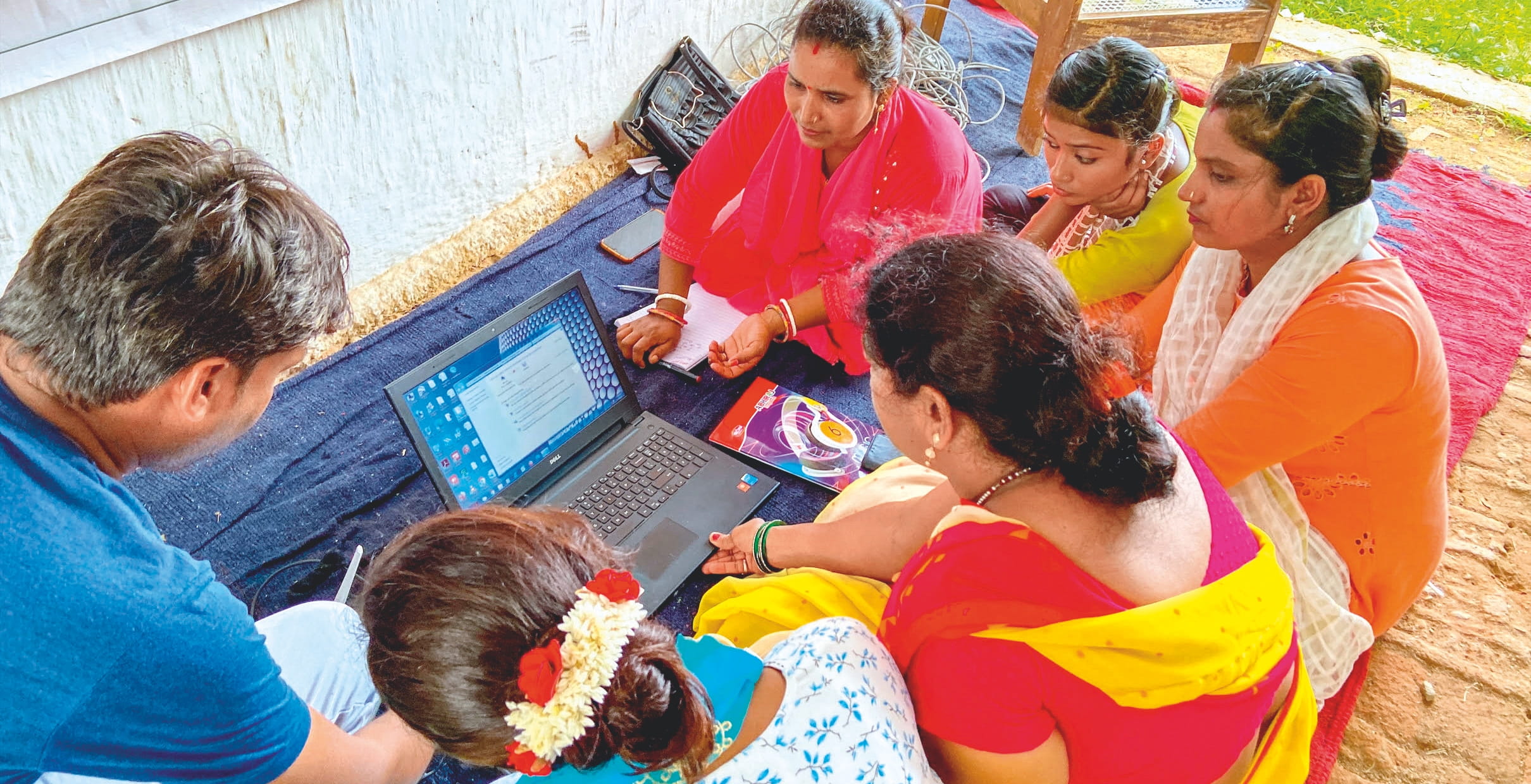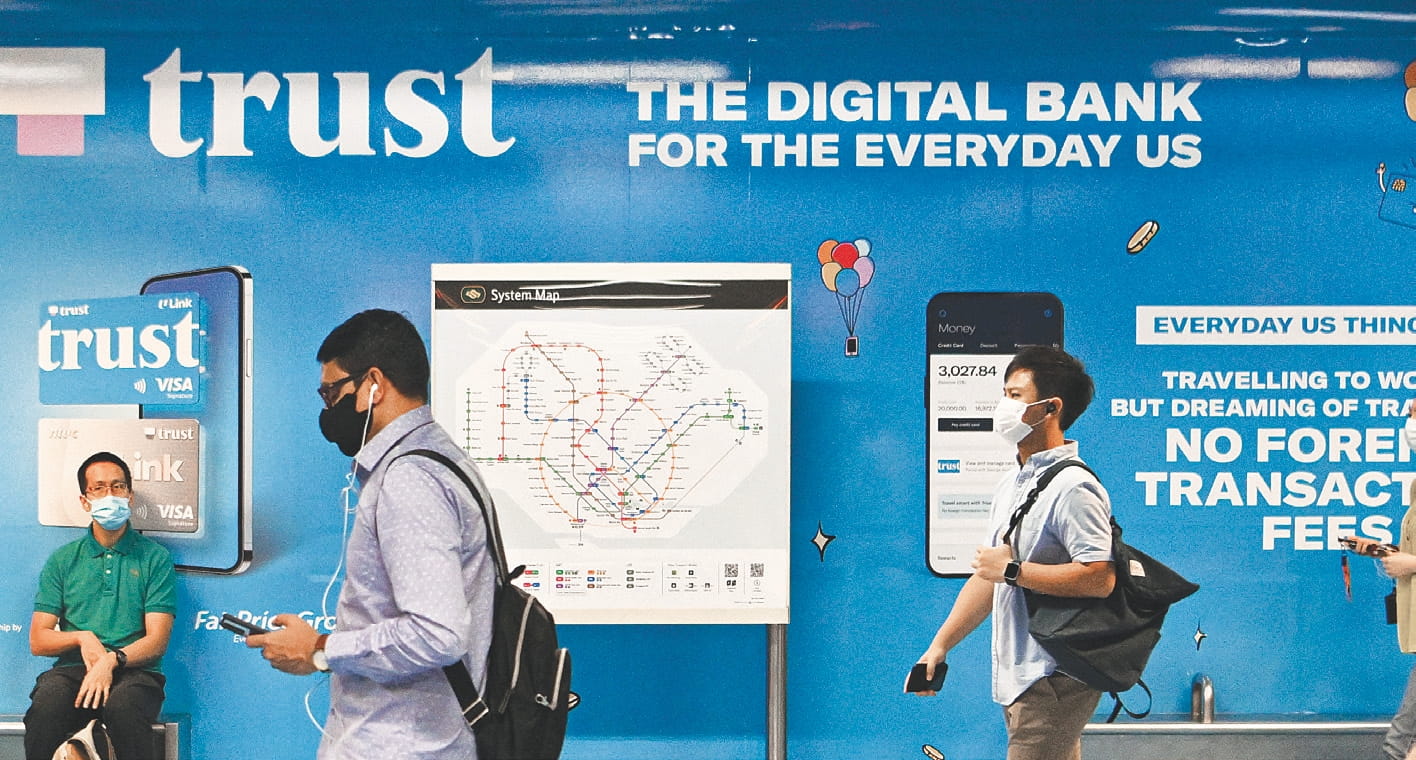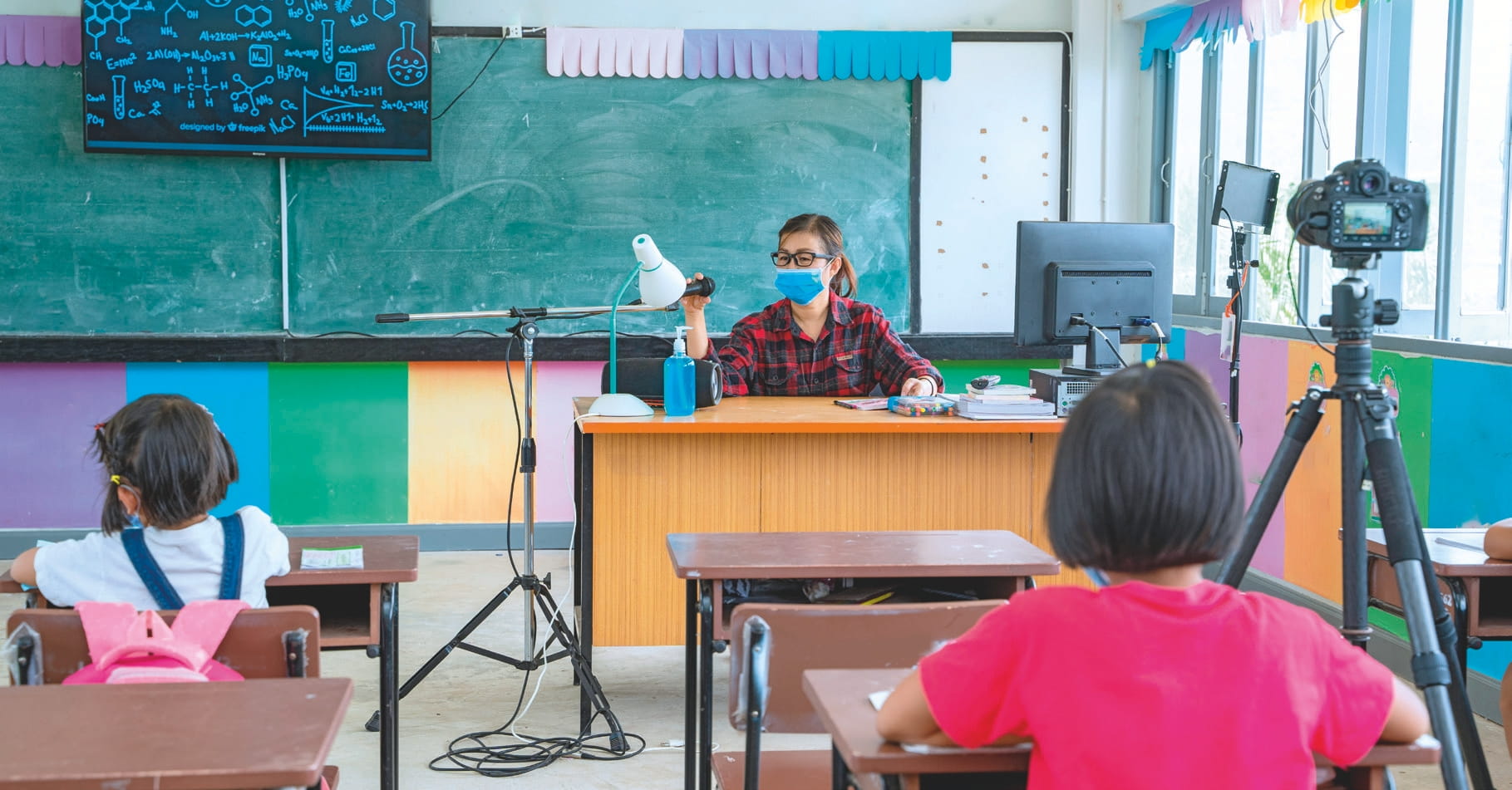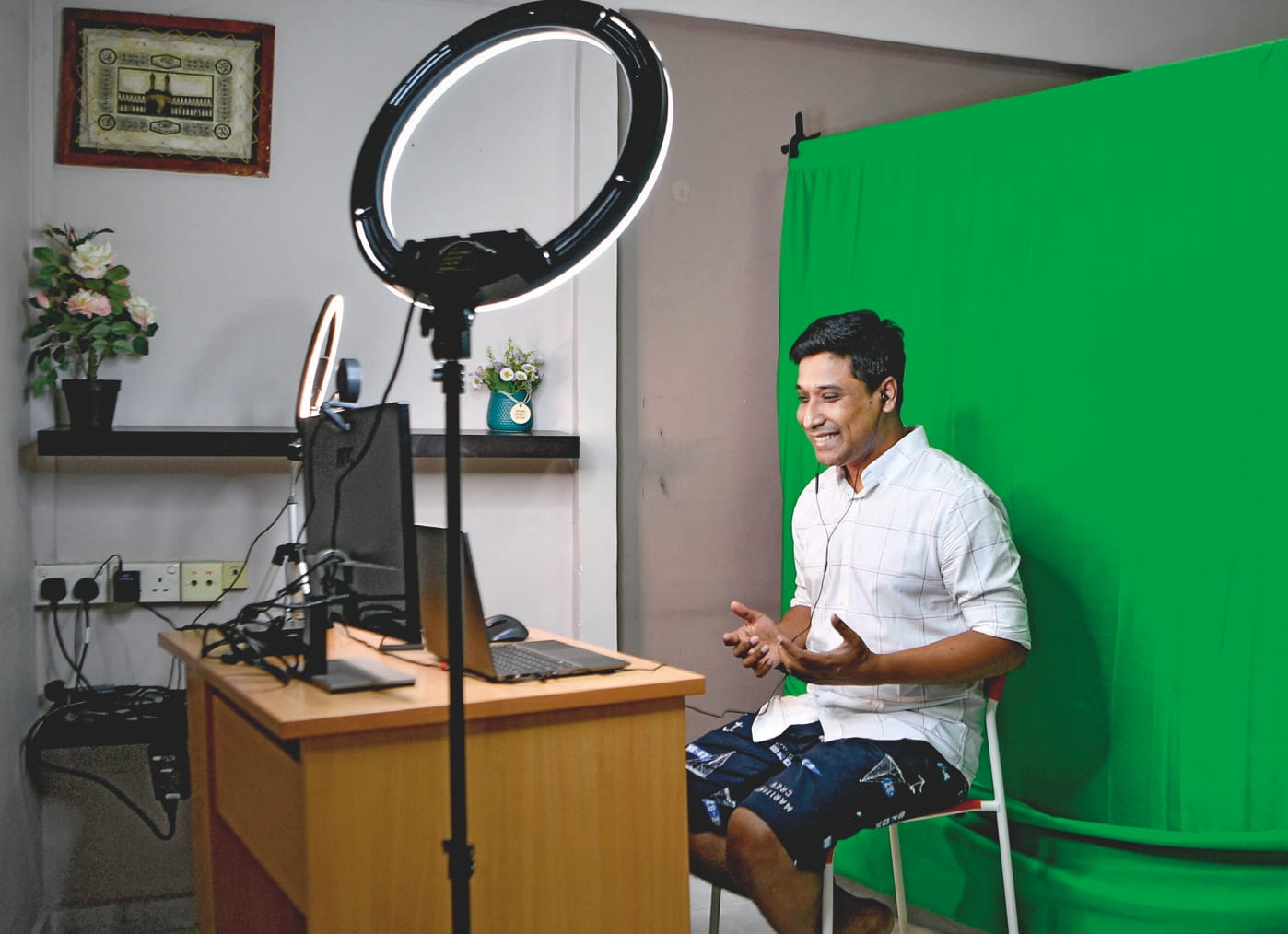Stories > Breaking The Digital Barriers
Breaking The Digital Barriers
The global Edison Alliance embraces technology-driven initiatives to improve the lives of people.
BY RAHIMAH RASHITH PHOTOS ISTOCK; THE STRAITS TIMES/SPH MEDIA

A digital trainer in rural India demonstrates to a group of self-employed women how to use technology to expand their businesses.
cross 90 countries, 454 million lives have been positively impacted through the activation of 250 initiatives. These are just some numbers from Edison Alliance — an open ecosystem of changemakers who are working together to promote digital investment and prioritise digital inclusion as a crucial component of achieving the United Nations (UN) Sustainable Development Goals (SDGs).
Launched in 2021 at the World Economic Forum (WEF), the Alliance is aimed at fostering cross-sector collaboration. With both public and private sector partners — including the Government of Singapore and multinational tech giant Google — the outfit aims to improve 1 billion lives globally through affordable and accessible digital solutions in health, finance and education by 2025.
“In today’s world, digital inclusion is critical to meaningful opportunities. It is foundational to economic growth and the SDGs. We might say that universal digital inclusion by 2030 is our ‘SDG Zero’. With 2.7 billion people still offline, we have plenty of work to do,” shares Derek O’Halloran, head of the WEF’s platform, Shaping the Future of Digital Economy and New Value Creation.

Fintech-driven digital banks such as Singapore-based Trust, a collaboration between Standard Chartered bank and grocery retailer Fairprice, are being touted as the future of accessible banking for everyone.
CATCHING UP WITH TECHNOLOGY
Remote provinces around the world with underserved populations struggle the most with a lack of digital infrastructure. But even in developed regions, socioeconomically disadvantaged individuals and groups remain susceptible to digital exclusion. They include low-income households, rural communities, the elderly, the illiterate, as well as people with disabilities. As more basic services continue to migrate online in the wake of the Covid-19 pandemic, these digitally excluded groups face increasingly formidable barriers to accessing essential health, education and financial services, and employment opportunities.
Accordingly, the Alliance has undertaken initiatives that include investing in digital infrastructure, offering virtual healthcare services to isolated communities, providing digital financial services such as e-banking and mobile wallets, as well as connecting schools to quality remote learning solutions. Alliance partners also conduct digital literacy and job skills training. In addition, the Alliance has created the Digital Inclusion Navigator, a tool that allows interested parties to explore potential collaborations through the display of real-world projects, their impact as well as partners.
In the two years since its launch, some 270 million people have gained access to digital services, while 52 million were given access to digital skills training (see sidebar on page 12). The Alliance’s impact was felt most keenly in South Asia and southern Africa, which are also the two regions most in need of digital inclusivity support.
“No one government or non-profit, however big, would be able to undertake such a challenge as digital inclusion. And to do it on the three most important fronts – public, private and people.”
Shobana Kamineni, executive vice-president, Apollo Hospitals, India
PUBLIC-PRIVATE PARTNERSHIPS
With only 45 per cent of the 1 billion target reached, continued partnerships are essential to helping the Alliance achieve its goals. “No one government or non-profit, however big, would be able to undertake such a challenge as digital inclusion. And to do it on the three most important fronts — public, private and people,” says Shobana Kamineni, the executive vice-chairperson of Apollo Hospitals in India and an Edison Alliance board member, who stresses the importance of all three fronts coming together to bridge the digital divide.
In India, for example, the Apollo Telemedicine Networking Foundation (ATNF) has collaborated with American Tower Corporation to set up five digital dispensaries to provide healthcare services to 250,000 people residing in 200 remote villages, including those in the farthest reaches of the Himalayas, 4,267m above sea level. ATNF offers digital teleconsultations for basic diagnostics. It also provides medication and pharmacy services, as well as social awareness programmes, all for just US$10 per year.
In Char Kukri Mukri, a remote island on Bangladesh’s southernmost Bhola district, residents are excluded from basic public services, banking and commerce due to the region’s physical disconnect from the mainland. With the support of the United Nations Development Programme, a2i — the flagship digital transformation programme of the Bangladesh government and a partner in Edison Alliance — has set out to transform the delivery of public services to these communities by setting up Digital Centres in over 4,500 union councils. These facilities aid in securing social welfare payments, applying for passports and mobile money transactions.
Meanwhile, AstraZeneca, the pharmaceutical giant and Edison Alliance member, has pledged to screen five million patients in Latin America, Asia, the Middle East and Africa for possible lung cancer by 2025 through its collaboration with Qure.ai. The latter is a health-tech firm that helps in early detection by utilising artificial intelligence to interpret radiology images. Thus far, 0.9 per cent scans out of 85,000 in 21 countries have been identified as high-risk lung nodules.
INCLUSIVE DIGITAL ACCESS
Closer to home, Singapore’s commitment to Edison Alliance’s 1 Billion Lives Challenge includes enabling less technology-savvy individuals to participate in the digital domain as part of the Digital for Life Movement, equipping seniors with the skills to use digital services, improving access to e-learning for youths, as well as to healthcare e-services.
Although 99 per cent of Singapore households have access to the Internet, the island-state stresses the importance of building on these foundations to enable people to navigate the digital world confidently.
“From remote work and virtual schooling to telemedicine and online shopping, access to digital resources has become today’s social leveller,” shares Patrick Hee, the CEO of Singapore non-profit Engineering for Good (E4G).

In Thailand, teachers record lessons for those children in remote areas who are unable to physically attend school.
“From remote work and virtual schooling to telemedicine and online shopping, access to digital resources has become today’s social leveller.”
Patrick Hee, CEO, Engineering for Good
In the past few years, E4G has provided old, refurbished laptops to children from low-income households. This has enabled them to continue home-based learning, which most secondary schools allow students to carry out up to twice a month. To date, the non-profit has distributed over 8,000 laptops and saved 3,641,000kg of carbon footprint — in tandem with Singapore’s Green Plan 2030 that in turn aligns with the UN SDGs.
Meanwhile, the Singapore International Foundation has launched DigiLABS, a four-year e-volunteering initiative aimed at upskilling youths in Asia and enhancing their employability to thrive in a digital economy. Participants will help drive social innovation and change in their community through the application of digital solutions, taught to them by skilled volunteers from four fields: artificial intelligence, cybersecurity, data science and digital marketing.

Bangladeshi migrant worker Nazmul Khan conducts mental health support workshops for fellow migrant workers through song and social activities conducted via Zoom.
GRASSROOTS DIGITALISATION
Ground-up digital initiatives have also mushroomed lately for vulnerable members of the community, such as migrant workers in Singapore. These include online mental health support, as well as English language and skills learning through WhatsApp and Zoom.
Perhaps, the greatest impact of digitalisation can be seen in financial transactions. “I can receive and check my salary on the bank’s digital app, remit money to my family, and order food,” shares 31-year old Bangladeshi construction supervisor Fauzy Sohoel.
Significantly, Singapore’s fintech industry recognises the importance of leveraging digital innovation to level up underserved communities in the region. Fintech company FinAccel, which is also a member of Edison Alliance, currently operates Kredivo, a digital credit platform for retail customers in Southeast Asia. It has pledged to provide access to digital financial services for up to 20 million underbanked or completely unbanked people in Indonesia, Vietnam, Thailand and the Philippines by 2025.
“Financial services are crucial for laying the groundwork to a better and more productive life, and this partnership with Edison Alliance puts us one step closer to providing access to financial services that better the lives of tens of millions,” says Akshay Garg, founder and group CEO of FinAccel.
Despite the uptick in economic digitalisation, more needs to be done, stresses Lisa Meng, programme head for digital inclusion at Edison Alliance. “Having the support of organisations like Kredivo, with a positive track record of serving underbanked communities, is an important step in advancing digital inclusion in Southeast Asia,” she says.
DIGITAL REVOLUTION
Edison Alliance has made strides in enhancing digital inclusivity around unserved and underserved communities around the world, according to a 2023 impact report released by the World Economic Forum.
18 MILLION
The number of people given access to online education, remote learning solutions and job skills training.
90 MILLION
The number of people given access to digital healthcare services, including remote care, telehealth platforms and telemedicine services.
280 MILLION
The number of people provided with access to digital financial services, such as e-banking, mobile wallets and e-payments.
